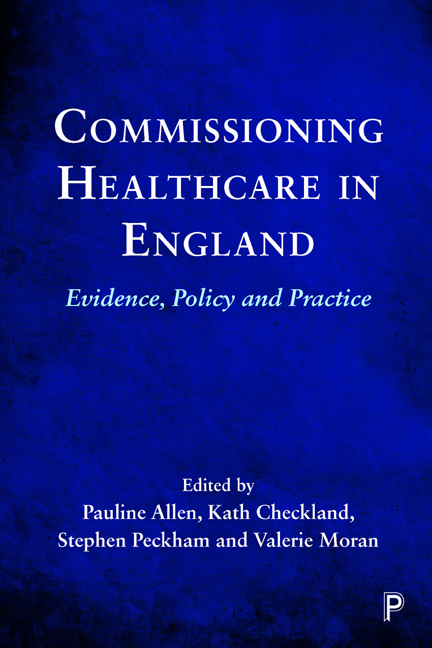Book contents
- Frontmatter
- Dedication
- Contents
- List of Figures and Tables
- List of Abbreviations
- Notes on Contributors
- Acknowledgements
- 1 Introduction
- 2 Context: Commissioning in the English NHS
- 3 The Development and Early Operation of Clinical Commissioning Groups (CCGs)
- 4 Clinical Engagement in Commissioning: Past and Present
- 5 Commissioning Primary Care Services: Concepts and Practice
- 6 Commissioning of Healthcare Through Competitive and Cooperative Mechanisms Under the HSCA 2012
- 7 Healthcare Contracts and the Allocation of Financial Risk
- 8 The Changing Public Health System: an Examination of the new Commissioning Infrastructure
- 9 Conclusion
- References
- Index
4 - Clinical Engagement in Commissioning: Past and Present
Published online by Cambridge University Press: 03 March 2021
- Frontmatter
- Dedication
- Contents
- List of Figures and Tables
- List of Abbreviations
- Notes on Contributors
- Acknowledgements
- 1 Introduction
- 2 Context: Commissioning in the English NHS
- 3 The Development and Early Operation of Clinical Commissioning Groups (CCGs)
- 4 Clinical Engagement in Commissioning: Past and Present
- 5 Commissioning Primary Care Services: Concepts and Practice
- 6 Commissioning of Healthcare Through Competitive and Cooperative Mechanisms Under the HSCA 2012
- 7 Healthcare Contracts and the Allocation of Financial Risk
- 8 The Changing Public Health System: an Examination of the new Commissioning Infrastructure
- 9 Conclusion
- References
- Index
Summary
Introduction
As discussed in Chapters 1 and 2, one of the central tenets of the HSCA 2012 was the desirability of increasing the involvement of GPs (and other clinicians) in the commissioning of services for their patients. This ideological commitment – based upon belief and founded, in part at least, upon an implicit denigration of managerial work (in order to increase control over the NHS and commissioners), had far-reaching consequences in the design of the reforms. For example, the initial separation of responsibility for commissioning primary care services from secondary and community services was deemed necessary because of the potential for conflicts of interest, whilst the creation of CCGs as ‘membership organisations’ had, as seen in Chapter 3, significant implications for their organisation and governance. The initial White Paper, ‘Equity and Excellence’ (Department of Health, 2010a: 9) was relatively non-specific about the expected benefits of clinical leadership of commissioning. It was argued that:
The headquarters of the NHS will not be in the Department of Health or the new NHS Commissioning Board but instead, power will be given to the front-line clinicians and patients. The headquarters will be in the consulting room and clinic. The Government will liberate the NHS from excessive bureaucratic and political control, and make it easier for professionals to do the right things for and with patients, to innovate and improve outcomes.
The document suggested that the proposals would: ‘liberate professionals and providers from top down control’; shift decision making closer to patients; enable better dialogue between primary and secondary care practitioners; and ensure that service development had real clinical involvement. However, the mechanisms underlying these perceived benefits were unstated. Furthermore, it was claimed that, whilst previous incarnations of GP-led commissioning (which in the UK go back to the creation of ‘GP fundholding’ in the 1990s) had delivered some benefits, these had been limited by the failure to give those involved complete autonomy and real budgets. The creation of CCGs, it was argued, would remedy these problems and ‘liberate’ clinicians to significantly improve care.
- Type
- Chapter
- Information
- Commissioning Healthcare in EnglandEvidence, Policy and Practice, pp. 49 - 62Publisher: Bristol University PressPrint publication year: 2020

